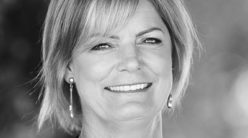As a patient I was stunned. As a medical professional I found it simply the final confirmation of the suspicions I had secretly carried for the past several months. The symptoms had become far too obvious for me to ignore any longer–an all-consuming thirst, frequent urination, constant exhaustion, and steady weight gain–so I finally called a trusted friend and told her my suspicions.
Dr. Lois Jovanovic, director of Sansum Clinic in Santa Barbara, California, and an internationally recognized diabetes expert, had a few choice words for me for not calling her sooner, and then ordered me to her office immediately. The blood tests she performed when I walked in the door confirmed what we both already knew. I had the same disease that had caused my father’s slow, miserable death; and I thus became a statistic, adding my name to the long list of 16 million diagnosed and undiagnosed diabetics in the United States.
I listened to Dr. Jovanovic in stunned silence, accepting the diagnosis with the same sense of resignation that a person accepts a death sentence being handed down by a judge. I saw my father when he was barely 10 years older than my present age, suffering those long-term complications I now saw in my future–blindness, kidney failure, multiple circulatory complications, and ultimately, heart disease. We found him with his nitroglycerin tablets spilled on the floor beside his bed.
She explained that Type II diabetes–formerly known as adult-onset or non-insulin-dependent diabetes mellitus–is by far the most common form of diabetes, affecting 85 to 90 percent of all diabetics. It is sometimes referred to as “insulin-resistant diabetes,” because while the body manufactures adequate amounts of insulin, Type II diabetics are unable to utilize the insulin that is produced (contrasted to Type I diabetes, in which the pancreas fails to manufacture insulin in sufficient amounts). Since cells require insulin in order to break down glucose into energy, high levels of glucose are trapped uselessly in the bloodstream, explaining why uncontrolled or undiagnosed diabetics suffer from chronic exhaustion. Its insidious onset often masks the disease for many years, postponing the diagnosis until one of the long-term complications appears. In a sense, then, I was “lucky” to have discovered it as early as I did.
On the way home I called my wife on my cell phone, and barely got the words out before I choked on them. I was not prepared to face my own mortality with such vivid memories clouding my vision. In the calm supportive voice I have grown to love over the years she said, “Don’t worry. We’ll handle this together.” I knew she meant it.
I withdrew from social life and turned inward. My medications, my diet, and the full-time task of feeling sorry for myself became the entire focus of my existence. At 276 pounds and with a blood sugar of 337 (normal range is 80-120), I knew I had a long uncomfortable road ahead of me. But I intended to force it upon no one outside my own family. I have always been a very private person, and this became my own personal battle.
A week later my fingertips had become reluctant pincushions and my medicine cabinet was, for the first time in my life, filled with prescription medicines and blood-testing paraphernalia. My family was coping with my dietary restrictions with gentle, yet firm, commitment. Their constant encouragement buoyed my flagging spirits, and the game of reading food labels became an enjoyable part of our trips to the grocery store. Even my teenage son got into the spirit of things, checking my meals to make sure I wasn’t cheating.
I began attaching the mental label of “poison” to high-carbohydrate foods, trying to give myself an image that would make it easier to avoid the foods that would drive my blood sugar dangerously high again. Believe me, seeing the skull and crossbones wavering in the ether mist over a piece of my wife’s steaming hot pecan pie was truly a nightmarish experience.
It didn’t take long before my efforts began yielding noticeable results. My blood sugar came under control in surprisingly short order. At my one-month follow-up visit I had lost 15 pounds, and my blood sugar was actually a bit low–low enough, in fact, that Dr. Jovanovic cut my medications in half. The sweet smell of success was beginning to replace the loss of that pecan pie. Another month, and I had dropped a total of 25 pounds. I reached a plateau another month later at 235 pounds, at which point my clothes were literally beginning to fall off me. I finally felt that I could begin exercising in earnest, and now, eight months after being diagnosed, I weigh 214 pounds. That’s 62 pounds less than where I started!
I run two miles each morning; my blood sugar recently was 96, and I have energy again. In short, I feel like a new person. My attitude toward life and my disease is greatly different from what it was that first morning when Dr. Jovanovic confronted me with what I perceived as a “death sentence.” I am fast approaching the point at which medication may no longer be necessary, and Dr. Jovanovic has begun referring to me as her “diabetes poster child.”
For me, the curse of being given the label of “diabetic” has turned into the blessing of a lifetime. It forced me to get control of my life and my health. I accept full responsibility for the management of both, and pursue them with a degree of vigor and enthusiasm I thought had long since left me. Lois Jovanovic told me that I would one day be thankful for my diabetes, and I could not for the life of me understand what she meant. Now I do. So I say, “Thank You, God, for giving me diabetes. And thank You for making my life worth living again.”







8 thoughts on “Thank You, God, for Giving Me Diabetes!”
Melissa Scott
(August 20, 2010 - 8:18 am)Thank you for sharing your wonderful story. If you accepted your fate in such kind of health, that’s good to hear. God makes this deed for a purpose. All we need to do is to understand why would God do such things in our life.
God Bless.
Rodney Howard Browne
(August 25, 2010 - 8:00 am)Thank you for this valuable post. It changed my way of thinking.
John avanzini
(December 16, 2010 - 1:13 pm)God respects us and He gave us the possibility to decide. Each of us chose the way we see things and the world around us. It’s vital what we feed ourselves on what we see, hear and meditate on. We need to feed ourselves on God’s word, because in this way our eyes will be enlightened to what we have in Christ Jesus.
Beatriz Stachniw
(December 29, 2010 - 1:28 pm)This article is really a testimonial-no, it’s not like the ones that some individuals create to be able to sell a product. What you read in this article can bring about a considerable change inside your life…should you will just take the few minutes to read all of what I have written. It could just save a life-maybe even yours.If you or a loved-one was diagnosed with pre-diabetes-this isn’t a death sentence! This testimonial originates from my wife, Margie. Some four months ago her annual checkup revealed that her blood glucose sugar was 6.8 on the hemoglobin alc test. 7.0 on this test is chronic diabetes. How close can you get.
Rodney Howard Browne
(December 30, 2010 - 1:31 pm)Splendid Thanks. I will definitely copy it to my blog, surely with link pointing towards you. Thanks.
Rodney Howard Browne
(January 2, 2011 - 7:59 am)I just wanted to comment your blog and say that I really enjoyed reading your blog post here. It was very informative and I also dig the way you write! Keep it up and I’ll be back to read more in the future.
Melissa Scott
(January 5, 2011 - 12:04 pm)For me this is so important. I was deeply touched by this message because I am going through a difficult time.
Melissa Scott
(February 1, 2011 - 3:08 pm)Hey, I added your site to my RSS reader. The posts are awesome!
Comments are closed.